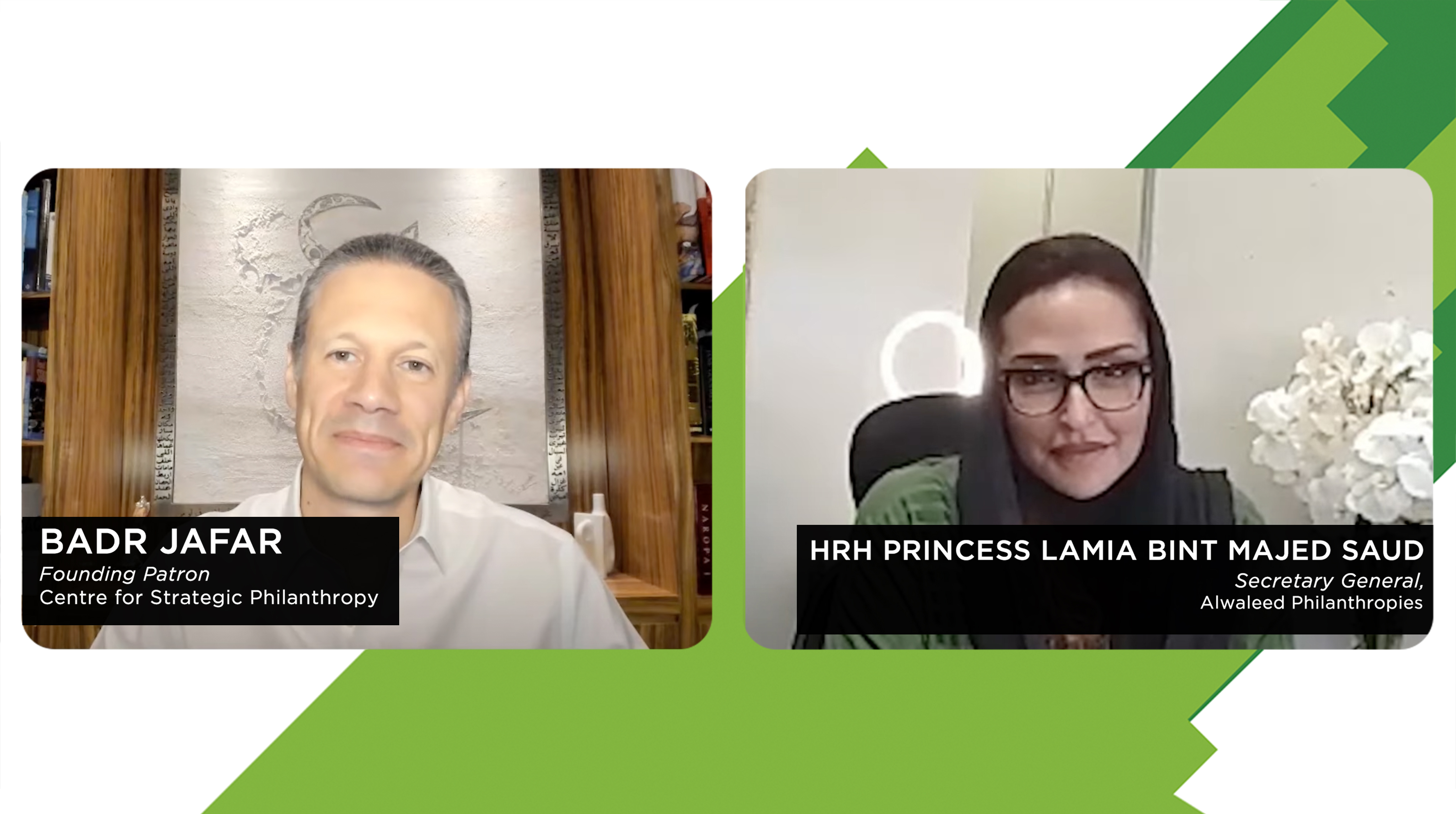Micheline Macari

Secretary General of Alwaleed Philanthropies, HRH Princess Lamia Bint Majed Saud Alsaud, Stresses the Importance of Strategic Collaboration in Building Sustainable Futures
- Sharjah, United Arab Emirates - Monday, 04. April 2022
- AETOSWire
-
Alwaleed Philanthropies has invested over four billion dollars on social welfare initiatives across 189 countries, benefiting over one billion people worldwide.
-
Among its numerous partnerships, Alwaleed Philanthropies sustained livelihoods among the Saudi disabled community through a collaboration with popular ride-hailing app, Careem.
HRH Princess Lamia Bint Majed Saud Alsaud, the Secretary General of Alwaleed Philanthropies, chaired by HRH Prince Alwaleed Bin Talal Bin Abdulaziz Al Saud, shared her perspective on the organisation’s local and global humanitarian aid efforts, as well as on her personal philanthropic journey, in an insightful conversation with Badr Jafar, Founder of the Cambridge University Centre for Strategic Philanthropy.
HRH Princess Lamia expressed her view that philanthropists must embrace cross-sector collaboration, as well as collaboration with each other, if they are to create sustainable networks and avenues for the communities they hope to serve. She outlined a recent collaborative initiative Alwaleed Philanthropies led: “We approached an organisation that cares for disabled people, with a view to forming a partnership with them. We told them that we’d like their people to be Careem captains; this would be possible through the use of a machine that allows people to drive with just their hands. We now have almost 100 disabled Careem drivers,” she elaborated. “Previously, organisations would donate money and medication as well as health aids and devices to these people, but we wanted to change their lives for the better and to give them lasting economical support. This was made possible through a joint collaboration between the government, Careem, and our foundation.”
Alwaleed Philanthropies was founded in 1980 by HRH Prince Al-Waleed bin Talal. Over the past four decades, the organisation has invested over four billion dollars on social welfare initiatives across 189 countries, benefiting over one billion people worldwide. Its focus lies across four main areas: community development, empowering women and young people, providing vital disaster relief, and the bridging of cultures.
Badr Jafar remarked, “The power of strategic philanthropy lies within not just focusing on the immediate, but also on building resilience for the future. The spirit of collaboration is key in this, because we can all go further together.”
The youth of today are playing a pivotal role in the future of strategic philanthropy. In particular, next-gen donors’ embrace of technology and boundary-blurring innovations is creating opportunities for more accessible and transparent giving mechanisms. HRH Princess Lamia expanded, “Technology has made philanthropy much easier; reaching out, creating awareness, it’s not how we used to do before. We now have a wider perspective, a better understanding of how we can help. If you want to know what people are facing in real-time, there are communities on Facebook that you can join to see what refugees, displaced people, disabled people, and other marginalised groups from across the world need in order to overcome adversity.”
The conversation between HRH Princess Lamia Bint Majed Saud Alsaud and Badr Jafar is part of The Business of Philanthropy series of discussions hosted by the Centre for Strategic Philanthropy at the University of Cambridge, to explore the changing nature of charitable giving across the world’s growth markets and to find new ways in which the sector can maximise its impact.
The full conversation can be viewed here.
About the Business of Philanthropy
The Business of Philanthropy is a series of conversations hosted by Badr Jafar exploring the changing nature of philanthropy within and from the high-growth regions of the world. The discussions are part of a limited series conducted in collaboration with the Centre for Strategic Philanthropy, which was established at the University of Cambridge in 2020.
The Centre for Strategic Philanthropy is focused on strategic philanthropy both within and from the world’s emerging markets, which, for a number of reasons, are expected to become an increasingly important source of philanthropic capital and innovation over the coming decades. Through a combination of rigorous research, executive education and the convening of diverse voices, the Centre aims to become the leading hub of actionable knowledge to catalyse greater philanthropic impact from individuals and organisations in the world’s fastest growing regions.
About Alwaleed Philanthropies
For four decades, Alwaleed Philanthropies has supported and spent more than 4.4 billion dollars on social welfare and initiated more than 1,000 projects in over 189 countries, managed by 10 Saudi female members, reaching more than 1 billion beneficiaries around the world, regardless of gender, race, or religion. Alwaleed Philanthropies collaborates with a range of philanthropic, governmental, and nongovernmental organisations to combat poverty, empower women and youth, develop communities, provide disaster relief, and create cultural understanding through education.